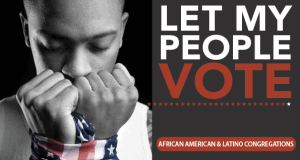A recent protest in Florida brought new attention to an old problem: felon disenfranchisement. In many states, particularly in the South, people with felony convictions are no longer allowed to vote or exercise other basic American rights – even long after their sentence is completed. Click here to watch video coverage of the Florida protest.
“Of the approximately 6 million disfranchised citizens in the United States, one-quarter are Floridians,” said Desmond Meade, one of the event’s organizers and Lifelines to Healing Director for PICO United Florida. “Florida’s disfranchisement rate is the highest in the country – more than 10 percent of the state’s voting age population is disfranchised, and a shocking 23 percent of Florida’s African-American population is disfranchised.”

Under restrictions implemented by Governor Rick Scott and his Cabinet, anyone convicted of a felony must wait between five to seven years upon completion of all portions of their sentence before they are allowed to apply to have their civil rights restored. There is an additional application processing time of approximately six years, bringing a total wait time of 11-13 years. Even after waiting 11-13 years, based on the current pattern for rights restoration, an individual has less than one percent chance of having their civil rights restored. SCSJ stands in solidarity with PICO in demanding a restoration of voting rights for all Americans who have completed their sentences.
Other issues faced by people with convictions are also addressed in the Florida protester’s video, including lack of opportunity to access employment, safe housing, and education – all of which make people less likely to commit further crimes and more likely to become contributing members of their communities. SCSJ refers to these barriers as the collateral consequences of incarceration – they are the unforeseen punishments beyond a jail sentence that often face people with criminal records. Our work to battle the collateral consequences of incarceration includes the following:
Clean Slate Clinics to educate people with convictions about their eligibility to clean up their criminal records. Potential services include expungements, certificates of relief, and driver’s license restoration.
Ban the Box campaigns throughout North Carolina to encourage cities and counties to remove the “have you ever been convicted of a crime?” question from initial job applications. Our Ban the Box Toolkit has everything you need to start a campaign in your part of the state.
Representations of individuals who wish to have a professional license, such as a plumber’s license or cosmetology license, reinstated following a conviction.
